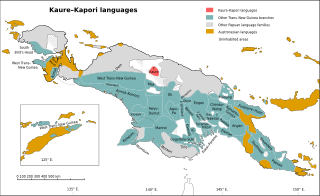Kaure language
| Kaure | |
|---|---|
| Native to | Indonesia |
| Region | Papua: Aurina, Harna, Lereh, Masta, and Wes villages on the Nawa River |
Native speakers | (450 cited 1995)[1] |
Kaure–Kosare
| |
| Dialects |
|
| Language codes | |
| ISO 639-3 | bpp |
| Glottolog | kaur1271 |
| ELP | |
 Map: The Kaure, Kapori, and Kosare languages of New Guinea
The Kaure, Kapori, and Kosare languages
Other Trans–New Guinea languages
Other Papuan languages
Austronesian languages
Uninhabited | |
Kaure is a Papuan language of West Papua. It is spoken in the villages of Lereh, Harna, Wes, Masta, and Aurina.[2][3]
Narau is either a dialect or a closely related language. It is known from a short word list in Giël (1959).[4] Texts include Auri et al. (1991).[5]
Phonology
[edit]Consonants
[edit]The Kaure consonants are:[6]: 456
| Labial | Alveolar | Palatal | Velar | Glottal | ||
|---|---|---|---|---|---|---|
| Nasal | m | n | ||||
| Plosive | voiceless | p | t | k | ||
| voiced | ᵐb | ⁿd | ʤ | |||
| Fricative | s | h | ||||
| Liquid | l | |||||
| Semivowel | w | j | ||||
Vowels
[edit]The Kaure vowels are:[6]: 456
| Front | Back | |
|---|---|---|
| Close | i, y | |
| Mid | e | o |
| Open | a |
Tone
[edit]Like the Lakes Plain languages, Kaure is a tonal language. There are two tones, namely high and low.[6]: 456
Monosyllabic minimal pairs showing phonemic tone contrast include:
- tái ‘footprint’, tài ‘sago’
- pí ‘boil’, pì ‘pig’
- hín ‘limbum wood’, hìn ‘blood’
- héik ‘flower’, hèik ‘snake’
In multisyllabic words, only one stressed syllable carries full tone contrasts, while the other syllables are "neutral" or toneless.[6]: 456
Multisyllabic minimal sets include:
- káteil ‘toss it’, katéil ‘dry’, katèil ‘dry’
- nálain ‘female animal’, naláin ‘kind of root’, nalàin ‘to run off’
Pronouns
[edit]Attested pronouns are 1sg wẽ, 2sg hane, 1pl nene. The 2sg form resembles Mek *ka-n, and 1pl resembles Pauwasi numu~nin, but apart from that little can be said.
Kaure pronouns listed by Foley (2018) are:[6]
Independent Possessive prefixes 1excl wen na- 1incl nene nene- 2 hane ha- 3 nene ne-
Kaure pronouns are not specified for number, just like in Nimboran.[6]
Kaure–Kapori hypothesis
[edit]Voorhoeve (1975) suggested that Kaure was related to Kapori and Kosare, two otherwise unclassified languages. However, subsequent evaluations have not found any significant connections (Rumaropen 2006, Wambaliau 2006).
References
[edit]- ^ Kaure at Ethnologue (18th ed., 2015) (subscription required)
- ^ van Voskuylen, E.; et al. "Kaure" (PDF). Kaure: 1. Archived from the original (PDF) on 2016-06-25.
- ^ "Kaure | Ethnologue".
- ^ Giël, R. 1959. Exploratie Oost-Meervlakte [Exploration of the Eastern Lakes Plain Area]. Nationaal Archief, Den Haag, Ministerie van Koloniën: Kantoor Bevolkingszaken Nieuw-Guinea te Hollandia: Rapportenarchief, 1950–1962, nummer toegang 2.10.25, inventarisnummer 13.
- ^ Auri, Piter, Peter R. Dommel and Markus Pokoko. 1991. Kaureki a Opoksel (Percakapan-percakapan Dalam Bahasa Kaure: Kaure Conversations). Jayapura: University of Cenderawasih and Summer Institute of Linguistics.
- ^ a b c d e f Foley, William A. (2018). "The languages of Northwest New Guinea". In Palmer, Bill (ed.). The Languages and Linguistics of the New Guinea Area: A Comprehensive Guide. The World of Linguistics. Vol. 4. Berlin: De Gruyter Mouton. pp. 433–568. ISBN 978-3-11-028642-7.
Further reading
[edit]- Benny Rumaropen (2006). Draft Survey Report on the Kapauri Language of Papua. SIL Electronic Survey Reports.
- Theresia Wambaliau (2006). Draft Laporan Survei pada Bahasa Kosare di Papua, Indonesia. SIL Electronic Survey Reports.
- Dommel, Peter R., Gudrun E. Dommel, Pieter Auri and Markus Pokoko. 1991. Kaure Vocabulary. Jayapura: Cooperative Program of the University of Cenderawasih and the Summer Institute of Linguistics.
- Dommel, Peter R. and Gudrun Dommel. 1993. Orang Kaure. In: Etnografi Irian Jaya: panduan sosial budaya (buku satu). 21–75. [Jayapura]: Kelompok Peneliti Etnografi Irian Jaya.
- Giël, R. 1959. Exploratie Oost-Meervlakte [Exploration of the Eastern Lakes Plain Area]. Nationaal Archief, Den Haag, Ministerie van Koloniën: Kantoor Bevolkingszaken Nieuw-Guinea te Hollandia: Rapportenarchief, 1950–1962, nummer toegang 2.10.25, inventarisnummer 13. (Contains word lists of Taworta, Taria, Airo, Kaowera, Manowa (Boromesso), and Narau)
